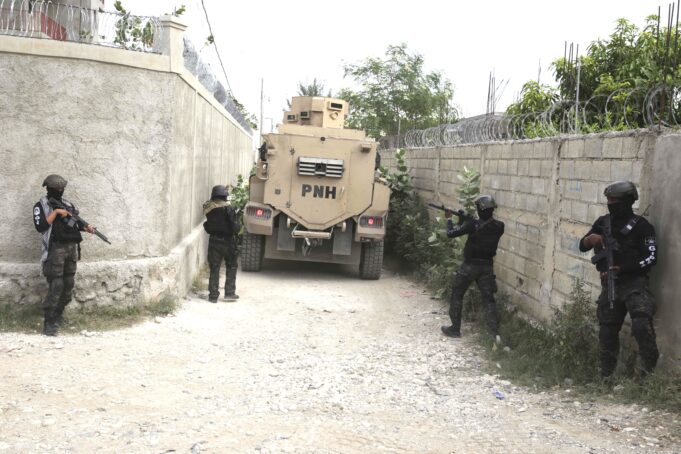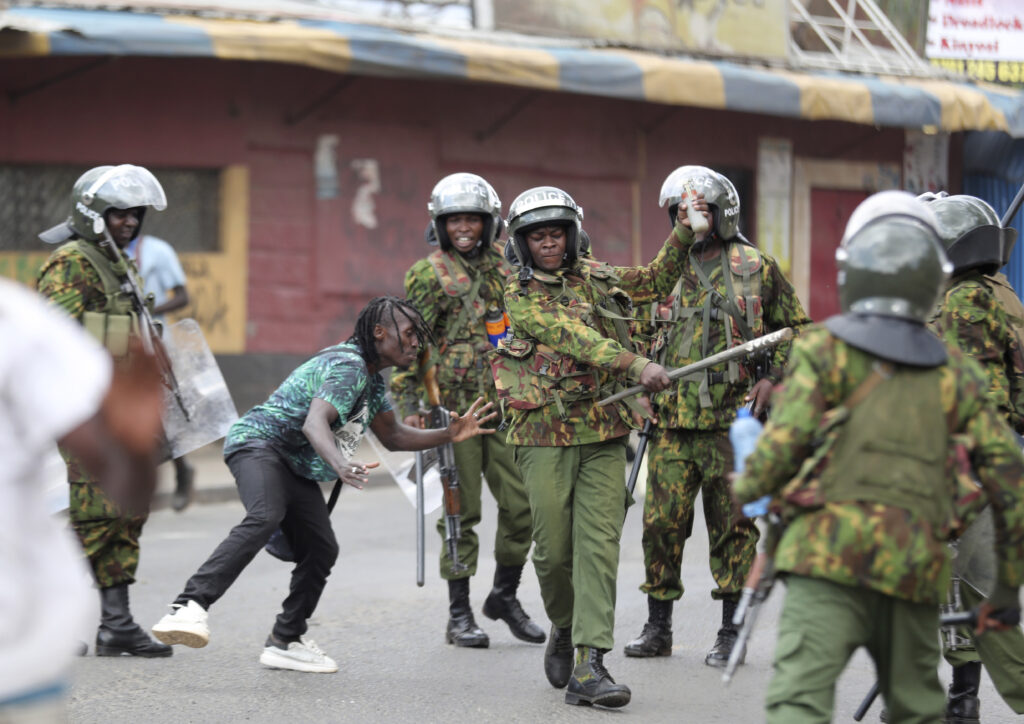As African leaders long for a greater voice, more respect, and acceptance as equals to their Western counterparts on the global stage, observers and analysts question at what cost and how far are they willing to go for acceptance. That question is being raised after the East African nation of Kenya recently stepped forward to lead a sought-after multination intervention force in Haiti.
In July, Kenyan Foreign Minister Alfred Mutua announced his country’s willingness to send 1,000 police to train and assist the Haitian National Police to “restore normalcy” and “protect strategic installations” in the Caribbean island nation. The stated pretext for foreign boots on Haiti’s soil is combating gang violence permeating the country. For nearly one year the call for foreign forces was issued by the U.S., Canada, and Haiti’s de facto leader Ariel Henry.
“Kenya stands with persons of African descent across the world, including those in the Caribbean, and aligns with the African Union’s diaspora policy and our own commitment to Pan Africanism, and in this case to ‘reclaiming of the Atlantic crossing,’” said Mr. Mutua, in a July 29 statement posted on X, the platform formerly known as Twitter.
The move is pending approval after the results of an assessment visit to Haiti by the Kenyan government, and a resolution by the UN Security Council. The U.S. State Department announced the U.S. and Ecuador would draft a resolution to authorize the deployment of an international security force.
“The United States, along with Ecuador, are going to introduce a resolution at the UN Security Council to take that step,” State Department spokesman Mathew Miller told journalists on July 31. Mr. Miller said after Kenya had conducted their initial assessment mission, the U.S. will be in contact with them. “We are committed to finding the resources to support this multinational force,” he said, but added, “It’s too early to get into new details about what those resources might be.”
No date for the visit or resolution was announced. For years Haitians have suffered severe turmoil, periodic natural disasters, and political gridlock induced by decades of foreign interference and internal corruption. Since the July 2021 assassination of Haitian President Jovenel Moise, a fragile régime descended further to a broken nonexistent government.
Civil society groups, activists, and Haiti advocates have rejected the prospect of foreign intervention, calling instead for a Haitian solution to the country’s crises.
With Mr. Mutua announcing Kenya’s interest and invoking “Pan-Africanism,” inquiring minds want to know how is invading another Black nation Pan-African, while answering the call of powers that are Pan-European with a Haitian subordinate?
For some critics, the move amounts to being a Black public face for the U.S. and Core Group of “puppeteers” and Mr. Henry, their Haitian “marionette.” The Core group represents the U.S., the UN, Brazil, Canada, France, Germany, Spain, the European Union, and the Organization of American States. Because this move of involving Kenya was sold as bringing peace to a terrorized Haitian public it may seem acceptable to some. But there is skepticism.
“On the surface, it appears to be the right thing,” Joseph Makhandal, the Nation of Islam representative to Haiti, told The Final Call. “Based on principle, it is only right when a brother is in a dire situation … for another brother, whether he is close in proximity or far in proximity to come to the aid of another brother,” said Student Minister Makhandal. “That is a general principle,” he added.
In fact, Mr. Makhandal, who is an attorney, said before and after Haiti’s own independence from France in 1804, Haitians assisted other people in breaking from oppressors. They are on record helping the colonies—that became the United States—fight against the British.
When Haiti became independent the goal of independence leader Jean-Jacques Dessalines was to free any oppressed nation from their oppressors. So, there is a history of nations helping nations, explained Mr. Makhandal.
“But the problem in this current context … it is controlled by the very enemy of Haiti,” he said.
If you were to ask Haitians on the ground, who are being subjugated to this constant instability and insecurity, they will welcome any solution to alleviate the constant fear under which they are living.
“So, that’s an emotional reaction, which has some legitimacy. Because those people are the ones who are experiencing the pain and any relief from anyone is welcome,” Mr. Makhandal stated.
But many Haitians are woke enough to recognize the Core Group is the source of the current insecurity. “It does not make sense for the same Core Group including the United States to lead in presenting solutions to the problem that they created in the first place,” Mr. Makhandal reasoned.
Besides Kenya answering the beck-and-call of Western powers who courted countries to lead an incursion into another Black country nearly 8,000 miles away, the Caribbean nations of Jamaica, and the Bahamas also signed on. Critics argue that Kenya, Jamaica, the Bahamas, and the 15-member Caribbean Community (CARICOM) are engaging in the unprincipled entanglements of imperialists.
For CARICOM, the endorsement is a 360-degree backpedal from June when it rejected the idea of multinational boots returning to Haiti. At the time, Prime Minister Philip Davis of the Bahamas, as CARICOM chairman, said there was “no appetite” among CARICOM nations for sending forces. “We think it should be a Haitian solution,” he said on June 15.
Some point out it is an unfortunate trend that is also being played out in Africa where the regional Economic Community of West African States (ECOWAS)—hooking up with these same powers—threaten to invade Niger, under the ploy of crushing a coup d’état. But it’s Africans willing to spill the blood of Africans for the strategic interests of White European and American mischief-makers in the shadows, argue critics who are opposed or wary of Kenyan involvement.
Meddling is an old strategy where the U.S. and its cast of imperialists crawl deep within the internal affairs of a nation. Everywhere America felt they needed “regime change,” they already hand-picked persons they felt would be amenable to America’s foreign policy objectives. America instigates instability.
Haiti has been the target of U.S. errant policies for decades, observers argue. “America is not interested in a democratically elected government that produces a government that she is not in control of and cannot have free access to the natural resources of that nation,” said the Honorable Minister Louis Farrakhan of the Nation of Islam, in Part 34 of “The Time and What Must Be Done,” a weekly broadcast that originally aired in 2013.
“The C.I.A. (Central Intelligence Agency), the N.S.A. (National Security Agency), and the government of the United States of America would engage covertly, in creating and exploiting differences that naturally exist in all nations,” said Minister Farrakhan.
They place money behind these differences that would one day explode into possible civil war, fratricidal conflict, death, and destruction. All based on the lies of this mischief-maker and universal bloodshedder, the Minister explained.
The U.S. and EU have invested millions of dollars in training and support of the Kenyan police force. While Kenya’s willingness to send its police is lauded, rights advocates expressed deep concerns. Kenyan police were reproached earlier this year over infractions that included extrajudicial killings and heavy-handed crackdowns on protestors.
“Kenyan authorities should stop glossing over the abuse of protesters by the police and other acts of violence,” said Mausi Segun, Africa’s director at Human Rights Watch. “They should urgently and thoroughly investigate police abuse during recent protests, including the failure to protect demonstrators from attacks by others,” she said in March.
Experts say that the U.S., Canada, and the United Nations have lost credibility among the Haitian people, as far as interventions in Haiti because of past experience. There are concerns about sending a security force who don’t speak French or Creole. There is also worry about the possible return of bygone days when UN peacekeepers abused Haitians.
It was UN peacekeepers who corrupted the waters leading to a cholera outbreak killing tens of thousands of Haitians. Analysts said this history speaks to a U.S. and UN credibility problem among Haitians and why a “non-UN multinational force” rather than a “peacekeeping operation” is being requested.
Another problematic issue is the misnomer being sold that the foreign forces are being invited in by the Haitian government. Critics retort that this is a fallacy because Haiti has no functioning government and an imposed leader.
“There’s not a single elected official left in the country,” said Seth Donnelly, author of “The Lie of Global Prosperity” and an activist with the Haiti Action Committee. The last time Haiti had elections was in 2016 and were deemed repressive and fraudulent and everybody, including mayors, are termed out, Mr. Donnelly points out.
In this context, what the mainstream media calls gangs is better understood in Haiti as “heavily weaponized paramilitaries”—that work more often than not—with the regime to terrorize popular neighborhoods of opposition, said Mr. Donnelly.
“So you have an unelected government working with paramilitaries to terrorize neighborhoods that are bases of opposition in the poor majority,” he said.
The vulnerability to violence is compounded by increasing hunger, fuel shortages, and major price hikes in food. The number of food-insecure Haitians has tripled since 2016. 4.9 million people lack enough to eat and 1.8 million are facing emergency levels of food insecurity. It’s a humanitarian disaster.
“The regime itself, knowing that it has no legitimacy, and would crumble in a matter of days without U.S. support, has called for another foreign intervention,” said Mr. Donnely. He says the administration of President Joe Biden is the ultimate force behind Mr. Henry’s rule and for months it tried to cobble together an international force that can shore up his regime—and subject Haiti to a greater occupation.
CARICOM was not behind it if the U.S. and Canada directly invaded.
“It would be clear colonial occupation,” said Mr. Connelly. “So, the perfect solution … get the government of (President) William Ruto and Kenya to commit to sending 1,000 police,” he noted. “Clearly the U.S. is behind this,” he added.
History is a good teacher, and a look into the ways of the powers that control Haiti and marginalize Africa and the Caribbean, the leaders of Kenya and CARICOM should have declined to join an axis of belligerents, doing the bidding of the U.S. and the Core Group.
In his pivotal book “Message To The Blackman in America,” by the Most Honorable Elijah Muhammad, the Eternal Leader of the Nation of Islam, describes the mental condition of such nations, who readily do the undertaking of their enemies. The book was published in 1965.
“Many so-called Negroes, despise and hate ‘Black Supremacy’ without having knowledge of what this means, and yet they support and believe in ‘White Supremacy.’ If you say you do not either, then you are neutral. But nay—some must rule over the other. It is the law of nature,” wrote Mr. Muhammad.
“I say to you this is a disgrace to act so dependent and loving toward a people who have been your worst enemies, and who will go to war against each other before they will give you and me equal justice under their own laws,” he wrote.














